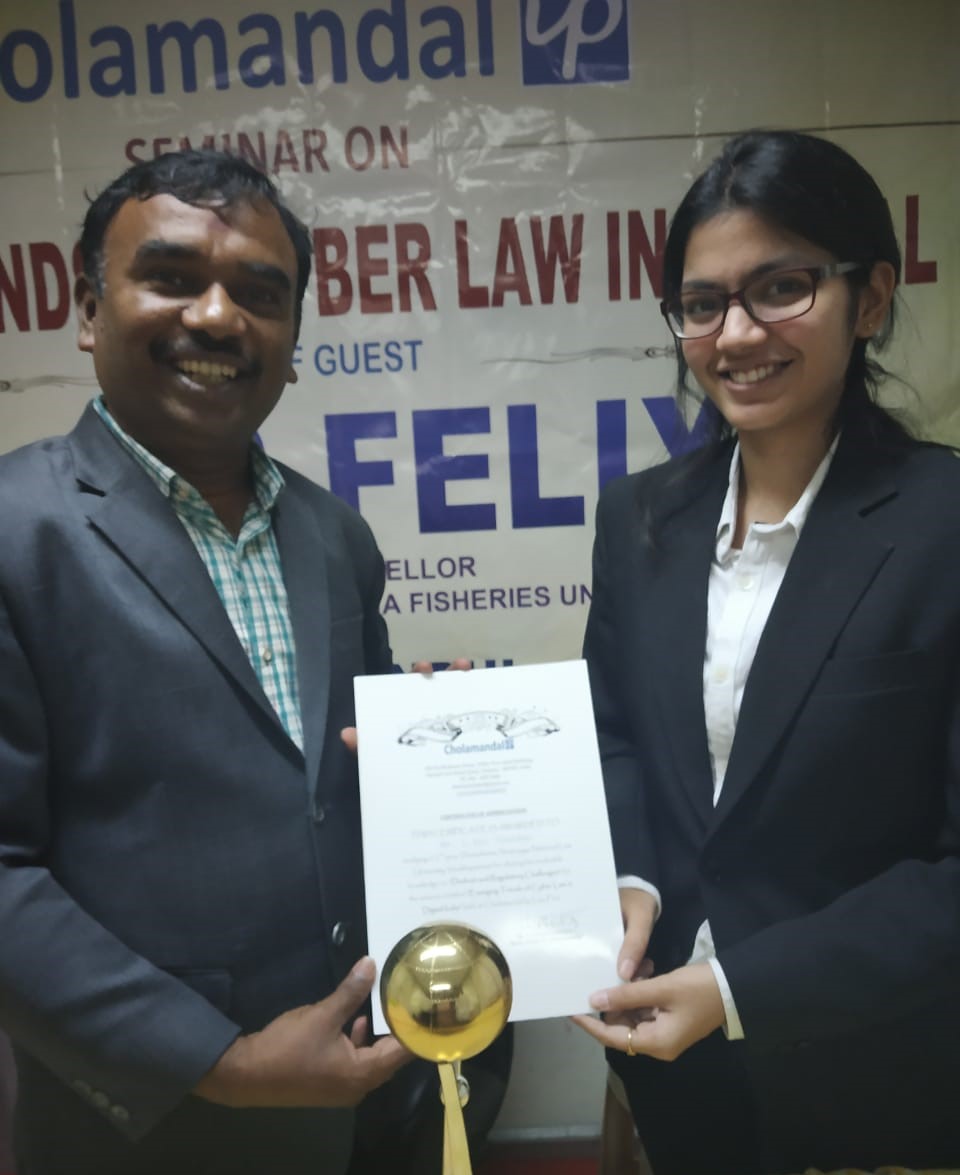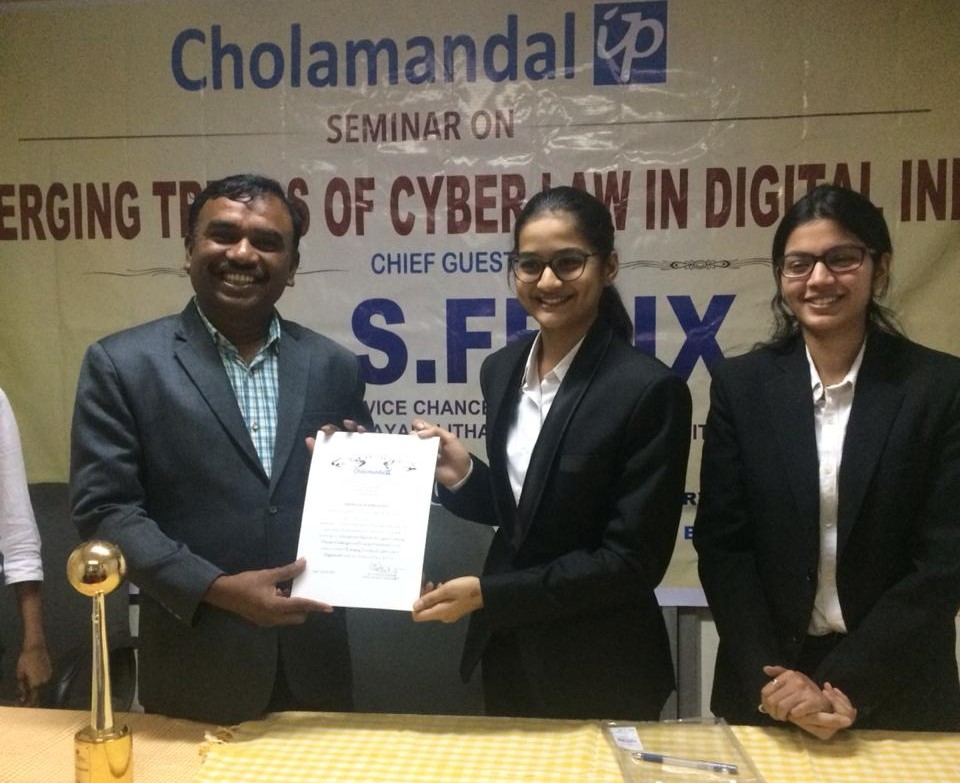EMERGING TRENDS OF CYBER LAW IN DIGITAL INDIA

INN/Chennai, @infodeaofficial
Intellectual Property Rights Attorney Association and Cholamandal IP law firm organized a one day seminar on Emerging trends of Cyber Law in Digital India. The seminar was conducted on December 22, 2018, at the YMIA building, Chennai, from 10:30 a.m. onwards. The Chief Guest at the event was Dr. S. Felix, the Vice Chancellor of the Tamil Nadu Dr. Jayalalitha Fisheries University. While delivering the chief-guest’s address, he mentioned that there is a need for awareness on emerging cyber laws and young lawyers should share such knowledge with other professionals, especially scientists.
Prior to the commencement of the seminar, a welcome address was delivered by Ms. Alifiya K. Mujpur, Research Associate at Cholamandal IP law firm.
Mr. P. Sanjai Gandhi, Advocate and President, Intellectual Property Rights Attorney Association, the chairperson at the event, focused his speech on the multivariate problems which have emerged in the light of our nation’s focus on developing a data protection regime. He spoke as follows:
“In this 21st Century world, how can we imagine this seminar being organized without the all-encompassing presence of the computers? I think that it would have been hard to imagine, though, even 20 years back, the rapid insurgency of technology that would take place even in our pockets. Due to the rapid enhancement, legislation has often been left outdated and ineffective in multiple respects.

I am of the belief that as a leading law firm, it is our duty to address the legal lacunae existing in our country right now and in my opinion, cyber law and security are parts of them. In the matters of jurisdiction, I think that there seems to be severe lapses of governmental authority. We see illegal piracy in the form of flourishing torrent websites, access to darknet matter without proper control, multiple violations of copyright, trademarks and other Intellectual Property Laws in the digital space without much sanction.
Apart from the aforesaid, I wish to tell you of the rise of crypto-currency in the form of bitcoins and unicoins which are being rapidly utilized for online scams and several blackmail emails. We have to develop an austere step and show to the world with good determination to step in and legislate on these matters and produce strict rules that shall prohibit others from even taking matters of cyber space lightly.
Cyber-crimes are an increasing threat to the cyber world. Victims of the crime can be anyone from individuals, to even Multinational Corporations (MNC). It poses the highest security risk to internet usage. But the greatest question that I put forward to you today is about the protection of our privacy that is under immediate threat due to the rise of cyber technology. After the EU’s conception of the GDPR, our nation too has released the draft of the Personal Data Protection Bill, 2018. In keeping with Hon’ble Supreme Court judgment, and particularly Hon’ble Justice Sanjay Kishan Kaul’s pronouncements, in the Justice Puttaswamy case, the prying of personal data for national security interests might be said to have been allowed. This is a matter of concern, as such invasions of privacy have a high propensity of turning against the average citizen.

Take for example the NSA’s conduct, before Edward Snowden blew the whistle on the entire matter. Constitutional concerns are part and parcel of any analysis of such privacy and cyber space related legislations, especially in the wake of the Puttaswamy judgment in our nation.
The greatest problem we are facing is that the IT laws in our country are not at par with international legislations. As we all know, online scams and crimes are increasing day by day. One day a situation might arise a Cyber War breaks out. To overcome these problems Cyber Security sector is developing to secure each and every person in the country to use the safe environment of the internet and later on every banking sector and IT sector will have a cyber security expert to overcome the problem of theft.
Very recently, the Central Government allowed 10 National Institutions to investigate on normal’s citizen’s mobile phones without their permission for security reasons. In times like these, us as a nation must sit down and contemplate the correct direction towards which we must march forward through. When we access our own computers and mobile phones, the person must be assured of accessing it without fear of injury or fraud.

I have no doubt in my mind that we are moving forward, and that all these great achievements f science and technology are there to take humanity to a superior level. However, for that purpose, we must protect the fundamental rights of all human beings. All obstacles to all cyber laws therefore should be dealt with so that we transform India on the same levels and perhaps even ahead of Western nations.”
The day before, the Home Ministry of the Government of India, via order, designated 10 central agencies to intercept, monitor, and decrypt “any information generated, transmitted, received or stored in any computer.” The Intellectual Property Rights Attorney Association expressed its view that certain parameters are necessary to conduct any activity of this sort, if at all. This cannot be conducted in an umbrella fashion, by guising it in the light of national security. National Security is important, however, the powers conferred in its name must be clearly demarcated. This is principally the case as nothing of this sort can be done by side-stepping constitutional law, especially in the light of the right to privacy which is now a fundamental right. The debate this generated further established the need for a strong and dynamic IT Law regime. Mr. P. Sanjai Gandhi further stressed that taluk-wise police stations might be an effective way of tackling concerns.
Later, a technical session was conducted, wherein the research associates, like Mr. Srijoy Deb, Mr. Sayantan Bhattacharyya, Ms. Nikhila, and others, spoke on multiple issues facing the world cyber law today. They encompassed everything from crypto-currencies, to sextortion scams, the darknet, and virtual reality. In culmination, the vote of thanks was delivered by Ms. Muskaan Jain.

